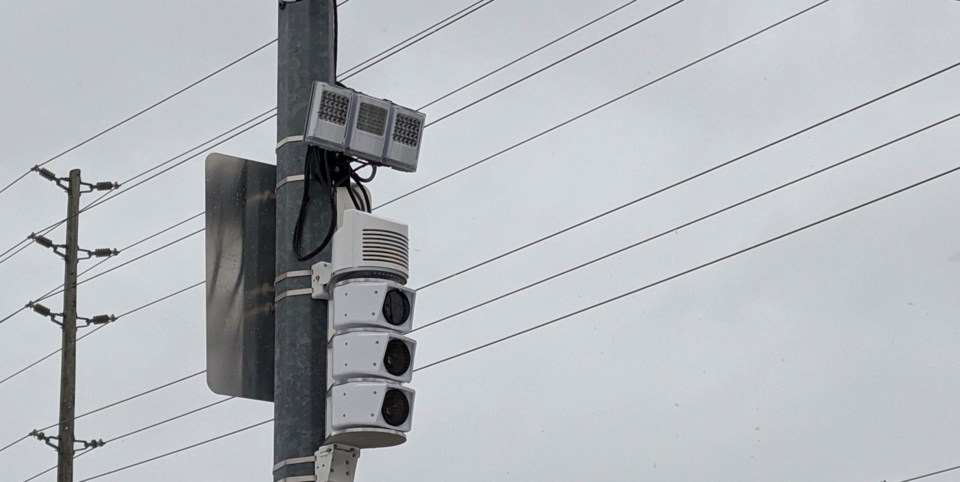It’s not a "cash grab."
Barrie’s automated speed enforcement (ASE) cameras program, that is, according to city officials.
But Deputy Mayor Robert Thomson said a March 27 city memo can make it look that way.
“When you see the report, it looks like it’s become a cash grab,” he said. “The priority was kids getting safely to and from school and trying to change the behaviour of drivers.”
Thomson credited Coun. Jim Harris with saying the greatest goal would be that this program would cost the city money, it would change behaviour, which would mean drivers had slowed down, and the city had invested in ASE cameras and not needed them.
Barrie’s ASE cameras nailed 9,240 vehicles for speeding at two city locations, with an average ticket fine of $90, from Dec. 1, 2023 until Feb. 18, 2024. The memo says 4,563 speeding tickets were issued on Big Bay Point Road and 4,677 on Anne Street North. Speeding fines totalling $463,065 have been paid to date.
Michelle Banfield, Barrie’s executive director of development services, said the ASE cameras program required $300,000 of initial investment — in staff, security, computers, technology, software and the cameras themselves.
“The intention never, ever has been that it’s a cash grab,” she said. “(Council) continues to be laser-focused on community safety zones.”
Banfield noted the city has also simplified the times so drivers know when the 40 kilometre an hour speed limit is in effect. Enforcement times changed to 7 a.m. until 5 p.m., Monday to Friday, Sept. 1 to June 30 at the ASE and variable times zones, basically when students are in school.
The intention, Banfield said, is if there is additional revenue from the ASE cameras tickets it’s to be invested in community safety measures. She said that could mean additional cameras, permanent seed bumps, etc.
“That’s the direction from council, to reinvest that money in things that will make our community safer,” Banfield said.
There is a significant difference between the tickets issued and the number of violations recorded at Barrie’s first two ASE cameras locations. Tickets for violations have only been issued if they occurred between 7 a.m. and 5 p.m., Monday to Friday, the prime period when vulnerable members of the community may be impacted by speeding, and due to limited available resources to process violations.
The number of tickets issued relates to whether the image captured is of adequate quality to issue a ticket, such as licence plates obscured by weather and/or just illegible. On Big Bay Point Road, 58,258 speed violations were recorded, along with 35,674 on Anne Street North, from 7 a.m. until 5 p.m., Monday to Friday.
“If this was a cash grab, I’m sure we would have tried a little harder to get tickets on all those people (on Anne Street North), but obviously not,” said Coun. Amy Courser. “It’s not a cash grab.”
Barrie’s ASE camera equipment alone cost $100,000 and yearly operating costs are $370,000, staff have said. The fines will cover a portion of the ASE program’s costs.
Local Authority Services (LAS), the business services arm of the Association of Municipalities of Ontario (AMO), and the city signed an agreement last summer that LAS will initially fund two provincial offences officers who will process speed-camera violations in Barrie.
Based on the rates of speed exceeding the maximum speed limit during the first several months of operation at the first two locations, the average ASE fine amount payable per ticket is approximately $90, the city says.
This is the same cost as an average ticket issued by police officers for the same violation, but an ASE violation does not include the loss of demerit points or a record on a driver’s licence — as the ticket is issued to the owner of the vehicle, not whoever is behind the wheel.
Similar to when tickets are issued by a police officer, many owners of vehicles who have been issued ASE violations have chosen to pay their fines. However, a portion of the defendants are requesting trials through the Provincial Offences Act (POA) court system.
As with regular tickets, there is a difference between the legislated payment period when a fine is to be paid and when the next steps take place to move the infraction to vehicle plate denial.
As such, $463,065 in gross fines have been paid into the court to date, the city says, which represents more than 50 per cent of the total fines. Court and operating expenses would be subtracted from this amount.
A total of 7,577 ASE charges have been filed with the courts, according to the city.
ASE fines go into POA Court revenues for the municipality where fines are laid, and are treated no differently than the charges that would be laid by a police service.
The city has said ASE speeding tickets will arrive within 30 days after the violation occurs.
ASE is a system that uses a camera and a speed-measuring device to detect and capture images of the licence plates of vehicles travelling faster than the posted speed limit in school or community safety zones.
Barrie’s ASE cameras were located eastbound on Big Bay Point Road, near Willow Landing and St. Michael the Archangel Catholic elementary schools, and southbound on Anne Street North, near Portage View and Nouvelle-Alliance schools.
The ASE cameras were moved to northbound Essa Road near Timothy Christian School, and westbound Ardagh Road in the vicinity of Heritage Baptist Church, near the end of February.




